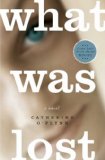Summary | Excerpt | Reading Guide | Reviews | Beyond the book | Read-Alikes | Genres & Themes | Author Bio

A Novel
by Catherine O'FlynnEvery once in a while a book comes along that takes your breath
away. What Was Lost is such a book. Catherine O'Flynn's stunning first
novel contemplates the loss of innocence and the dullness of modern life. A
simple story about two people's investigation of a young girl's mysterious
disappearance grows into a larger rumination on modernity, maturation, and love
under O'Flynn's deft and empathetic pen. The novel is divided into two main
narratives: Ten-year-old Kate Meaney's life as a detective and Lisa and Kurt's
experiences at Green Oaks shopping mall in 2004, two decades later. The two
narratives mirror each other in theme and action, and the result is an artfully
constructed and interesting whole.
Kate Meaney wants to be a detective. She enlists the help of her friend Mickey,
a stuffed monkey, and begins to look for crime in her neighborhood. She is a
diligent, respectful, and innocent child who wants to save good people from
criminals. She receives little adult supervision and is left to do much as she
pleases, which includes sitting in Green Oaks for hours observing her
"suspects".
O'Flynn creates a real child in Kate, and it is heart wrenching to think that
she is alone in public places with only her monkey and detective notebook for
protection. When the narrative shifts to the Lisa/Kurt plot, and it becomes
clear that Kate has disappeared, the meaning of the title bears down in full
force. Many things are lost when Kate disappears: innocence, childhood, love,
and possibility. When the truth about Kate's disappearance is learned, the real
pain of what is lost becomes even more acute.
The second half of the plot develops almost exclusively within the confines of
the Green Oaks shopping mall, a huge, creepy, soulless shopping center on the
edge of one of England's 'new towns' (planned communities developed after WWII).
Green Oaks has a haunting, dark history and the labyrinthine tunnels that run
behind the public spaces are scary. Gavin, the security guard that works with
Kurt, knows too much about Green Oaks and his monstrous fascination with the
dark places in the shopping mall is disturbing. The place has a character all
its own and the juxtaposition that O'Flynn makes between the empty shops on the
high street and the crowded shopping mall cannot be missed. Green Oaks
represents what is wrong with modern life.
Although the plot remains fascinating when the narrative shifts to Lisa/Kurt,
the best part of the novel is over when the Kate section is finished. Lisa, a
shop manager, and Kurt, a security guard, are aimless adults working in Green
Oaks. Juxtaposed to Kate's interest and passion for life, they are defeated and
discontent. Both of them are haunted by painful experiences and they come
together to investigate the mystery behind Kate's disappearance. The first
section of their narrative lags, though this might be because the overwhelming
desire to find out what happens to Kate makes it difficult to concentrate on
much else. Lisa and Kurt are nicely drawn, but they are merely vehicles for
solving Kate's mystery. Though the scenes in Lisa's shop, with the smart
sketches of irate customers and idiot bosses, are funny and provide a nice
counterpoint to the gothic, dark elements of the main narrative, they are
ultimately distracting.
This is a beautiful book, and it is a truly remarkable first novel. It has
everything necessary for a good read: absorbing characters, artful construction,
fascinating plot, mystery elements to keep the pace moving, and
thought-provoking themes. This is a novel not to be missed.
![]() This review
first ran in the July 11, 2008
issue of BookBrowse Recommends.
This review
first ran in the July 11, 2008
issue of BookBrowse Recommends.

If you liked What Was Lost, try these:

by Monica Ali
Published 2004
This gorgeous first novel is the deeply moving story of one woman, Nazneen, born in a Bangladeshi village and transported to London at age eighteen to enter into an arranged marriage.

by Jonathan Coe
Published 2003
As the world appears to self-destruct around them, four teenage friends hold together to navigate the choppy waters of a decidedly ambiguous decade - the 1970s.
Your guide toexceptional books
BookBrowse seeks out and recommends the best in contemporary fiction and nonfiction—books that not only engage and entertain but also deepen our understanding of ourselves and the world around us.